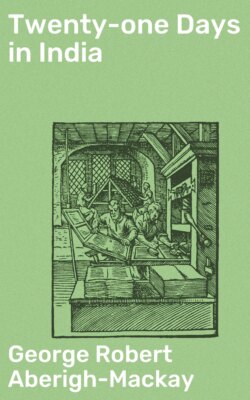Читать книгу Twenty-one Days in India - George Robert Aberigh-Mackay - Страница 4
На сайте Литреса книга снята с продажи.
Оглавление
No. I. THE VICEROY.
Table of Contents
It is certainly a little intoxicating to spend a day with the Great Ornamental. You do not see much of him perhaps; but he is a Presence to be felt, something floating loosely about in wide pantaloons and flying skirts, diffusing as he passes the fragrance of smile and pleasantry and cigarette. The air around him is laden with honeyed murmurs; gracious whispers play about the twitching, bewitching corners of his delicious mouth. He calls everything by "soft names in many a mused rhyme." Deficits, Public Works, and Cotton Duties are transmuted by the alchemy of his gaiety into sunshine and songs. An office-box on his writing-table an office-box is to him, and it is something more: it holds cigarettes. No one knows what sweet thoughts are his as Chloe flutters through the room, blushful and startled, or as a fresh beaker full of the warm South glows between his amorous eye and the sun.
"I have never known
Praise of love or wine
That panted forth a flood of sweetness so divine."
I never tire of looking at a Viceroy. He is a being so heterogeneous from us! He is the centre of a world with which he has no affinity. He is a veiled prophet. He who is the axis of India, the centre round which the Empire rotates, is necessarily screened from all knowledge of India. He lisps no syllable of any Indian tongue; no race or caste, or mode of Indian life is known to him; all our delightful provinces of the sun that lie off the railway are to him an undiscovered country; Ghebers, Moslems, Hindoos blend together in one dark indistinguishable mass before his eye.
A Nawab, whom the Foreign Office once farmed out to me, often used to ask what the use of a Viceroy was. I do not believe that he meant to be profane. The question would again and again recur to his mind, and find itself on his lips. I always replied with the counter question, "What is the use of India?" He never would see—the Oriental mind does not see these things—that the chief end and object of India was the Viceroy; that, in fact, India was the plant and the Viceroy the flower.
I have often thought of writing a hymn on the Beauty of Viceroys; and have repeatedly attuned my mind to the subject; but my inability to express myself in figurative language, and my total ignorance of everything pertaining to metre, rhythm, and rhyme, make me rather hesitate to employ verse. Certainly, the subject is inviting, and I am surprised that no singer has arisen. How can anyone view the Viceroyal halo of scarlet domestics, with all the bravery of coronets, supporters, and shields in golden embroidery and lace, without emotion! How can the tons of gold and silver plate that once belonged to John Company, Bahadur, and that now repose on the groaning board of the Great Ornamental, amid a glory of Himalayan flowers, or blossoms from Eden's fields of asphodel, be reflected upon the eye's retina without producing positive thrills and vibrations of joy (that cannot be measured in terms of ohm or farad) shooting up and down the spinal cord and into the most hidden seats of pleasure! I certainly can never see the luxurious bloom of the silver sticks arranged in careless groups about the vast portals without a feeling approaching to awe and worship, and a tendency to fling small coin about with a fine medieval profusion. I certainly can never drain those profound golden cauldrons seething with champagne without a tendency to break into loud expressions of the inward music and conviviality that simmer in my soul. Salutes of cannon, galloping escorts, processions of landaus, beautiful teams of English horses, trains of private saloon carriages (cooled with water trickling over sweet jungle grasses) streaming through the sunny land, expectant crowds of beauty with hungry eyes making a delirious welcome at every stage, the whole country blooming into dance and banquet and fresh girls at every step taken—these form the fair guerdon that stirs my breast at certain moments and makes me often resolve, after dinner, "to scorn delights and live laborious days," and sell my beautiful soul, illuminated with art and poetry, to the devil of Industry, with reversion to the supreme secretariat.
How mysterious and delicious are the cool penetralia of the Viceregal Office! It is the sensorium of the Empire; it is the seat of thought; it is the abode of moral responsibility! What battles, what famines, what excursions, of pleasure, what banquets and pageants, what concepts of change have sprung into life here! Every pigeon-hole contains a potential revolution; every office-box cradles the embryo of a war or dearth. What shocks and vibrations, what deadly thrills does this little thunder-cloud office transmit to far-away provinces lying beyond rising and setting suns. Ah! Vanity, these are pleasant lodgings for live years, let who may turn the kaleidoscope after us.
A little errant knight of the press who has just arrived on the Delectable Mountains, comes rushing in, looks over nay shoulder, and says, "A deuced expensive thing a Viceroy." This little errant knight would take the thunder at a quarter of the price, and keep the Empire paralytic with change and fear of change as if the great Thirty-thousand-pounder himself were on Olympus.
